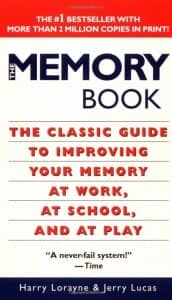 People have been talking for years about Harry Lorayne’s The Memory Book.
People have been talking for years about Harry Lorayne’s The Memory Book.
Is it the be-all-and-end-all of memorization books?
Hardly.
But it is well reviewed on Amazon, and many are right to praise it.
The Memory Book is good.
Yet, strangely, I rarely find it cited in the literature about memorization.
That’s sad. And here’s why:
The Memory Book features amazing chapters on association, substitution, memorizing names and faces and of course vocabulary …
On the bad side, here’s the books major deficit:
There are only 12 pages on how to memorize vocabulary. But that’s okay. It’s still a chapter on vocabulary all the same and its slimness inspired me to write my own books on how to memorize words.
That matter aside, you’re in for treat when you pick up this book.
Or reread it.
(Speaking of which, if you don’t have a re-reading strategy, then I recommend you get started with one. I personally re-read one book a month on average.)
And The Memory Book is well-worth going through at least a few times.
That’s because The Memory Book is actually a dialogue between two memory experts, Harry Lorayne and Jerry Lucas.
Instead of receiving a mono-voice lecture on the topic, you get two points of view. (You can expand your perspective even further by considering Lorayne in the context of Dominic O’Brien too.)
This feature of the book gives you the feeling that you’re sitting in on a conversation. As many a great detective has known, eavesdropping is a great way to learn.
Here are a few more things I like about it:
1. They make what seems like a complex process incredibly simple. This is because they focus on the peg system and related techniques almost entirely.
2. They inspire new ways of thinking about imagination and using it to store information in the mind. You might even pick up a few new tricks related to the Major Method.
3. They don’t bother with “thinking outside of the box.” They teach us how to think inside the box first – something that is sorely lacking in classrooms around the world.
4. It’s good for the soul. Reading other people with a similar interest in positively expanding the powers of your mind is an amazing experience.
5. It is an important book in the movement to bring us out of the dark ages in which mnemonics remains relatively unused in comparison to times of yore. (I know there are some historians who read this newsletter who will probably hate me for wording the past that way, but alas …)
6. Even thought it was published way back in 1974, The Memory Book still raises new questions.
Complaints About The Memory Book By Harry Lorayne?
Yes, actually.
Despite mountains of evidence demonstrating just how great the Memory Palace technique is, there is no focus on it.
This lack of attention to the method of loci and mind mapping appears to be a quirk of Lorayne’s. It’s one that has puzzled many students of memory.
If he really doesn’t use these techniques, no problem.
But what many find shocking is how he sometimes seems to dislike the Memory Palace approach with a sentiment approaching aggression.
I’m not sure why, but I still really like him.
Check out The Memory Book on your Kindle, in print or at your public library. You won’t regret it.
And while you’re there, look out for these additional Memory Palace Book suggestions.
And let me know your thoughts about the absence of the Memory Palace technique in the book. Totally fine? Or also lacking in your view?
Related Posts
- A Few Simple Ideas That Will Help You Trust Your Memory Skills
Learn about how to develop trust in your ability to memorize ... even if you…
- Timothy Moser Talks About Memory Skills and Productivity
In this episode of the Magnetic Memory Method Podcast, you'll hear from Timothy Moser, a…
- Defending Memory Expert Harry Lorayne And Dominic O'Brien
Memory expert Harry Lorayne is a master of modern memorization techniques. Learn why.



